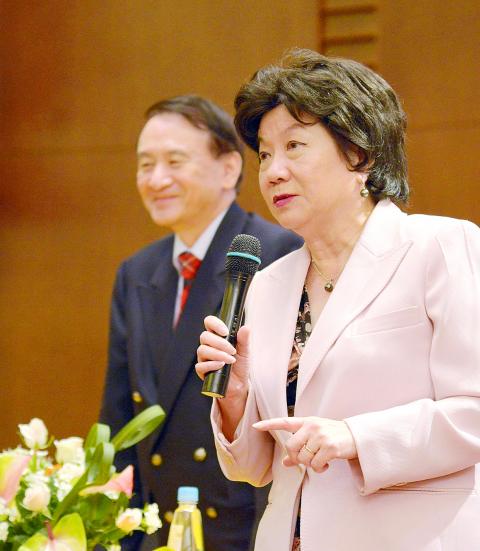Chung Yuan Christian University’s R&D Center for Biomedical Technology adjunct chair professor Esther Chang (張惠平) has been honored by the American Society for Nanomedicine with a lifetime achievement award for her contributions to promoting the development of nanomedicine, the school authority said on Monday.
The school said Chang has nearly two decades of experience in developing anti-cancer technologies, with more than 140 scientific publications and 108 international patents under her belt.
A new nanotechnogy-based cancer treatment developed by Chang, which uses nanoparticles as a drug-delivery system, is not only able to deliver anti-cancer therapeutic agents to the targeted tumor cells more accurately and efficiently, but also minimizes the harmful side effects of cancer therapies by enabling healthy cells to be spared, the school said.

Photo courtesy of Chung Yuan Christian University
“Chang’s innovative research on the nano-delivery system has been financially supported by the US’ National Institutes of Health, the nonprofit National Foundation for Cancer Research and other private biotechnology firms,” the school said. “The US Food and Drug Administration has approved the first stage clinical trial of the novel cancer treatment.”
The school quoted Chang as saying that her joy in seeing the treatment enter the human clinical trial stage was beyond description, as it brought her one step closer to her dream of developing an effective and cost-efficient anti-cancer therapy.
“Members of our research and development center unanimously agree that the accolade is well-deserved, and all look forward to witnessing Dr Chang’s next medical breakthrough,” the school said.

Beijing could eventually see a full amphibious invasion of Taiwan as the only "prudent" way to bring about unification, the US Department of Defense said in a newly released annual report to Congress. The Pentagon's "Annual Report to Congress: Military and Security Developments Involving the People's Republic of China 2025," was in many ways similar to last year’s report but reorganized the analysis of the options China has to take over Taiwan. Generally, according to the report, Chinese leaders view the People's Liberation Army's (PLA) capabilities for a Taiwan campaign as improving, but they remain uncertain about its readiness to successfully seize

Taiwan is getting a day off on Christmas for the first time in 25 years. The change comes after opposition parties passed a law earlier this year to add or restore five public holidays, including Constitution Day, which falls on today, Dec. 25. The day marks the 1947 adoption of the constitution of the Republic of China, as the government in Taipei is formally known. Back then the Chinese Nationalist Party (KMT) governed China from Nanjing. When the KMT, now an opposition party in Taiwan, passed the legislation on holidays, it said that they would help “commemorate the history of national development.” That

Taiwan has overtaken South Korea this year in per capita income for the first time in 23 years, IMF data showed. Per capita income is a nation’s GDP divided by the total population, used to compare average wealth levels across countries. Taiwan also beat Japan this year on per capita income, after surpassing it for the first time last year, US magazine Newsweek reported yesterday. Across Asia, Taiwan ranked fourth for per capita income at US$37,827 this year due to sustained economic growth, the report said. In the top three spots were Singapore, Macau and Hong Kong, it said. South

Snow fell on Yushan (Jade Mountain, 玉山) yesterday morning as a continental cold air mass sent temperatures below freezing on Taiwan’s tallest peak, the Central Weather Administration (CWA) said. Snowflakes were seen on Yushan’s north peak from 6:28am to 6:38am, but they did not fully cover the ground and no accumulation was recorded, the CWA said. As of 7:42am, the lowest temperature recorded across Taiwan was minus-5.5°C at Yushan’s Fengkou observatory and minus-4.7°C at the Yushan observatory, CWA data showed. On Hehuanshan (合歡山) in Nantou County, a low of 1.3°C was recorded at 6:39pm, when ice pellets fell at Songsyue Lodge (松雪樓), a